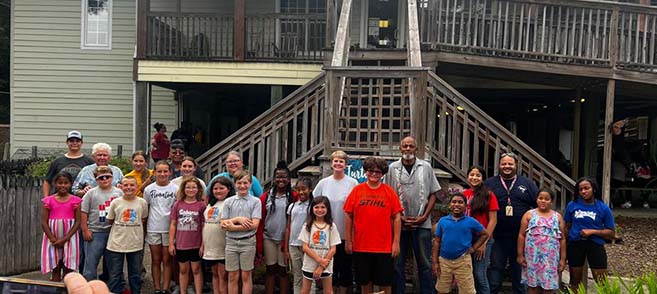
By DON FLETCHER
News Staff Writer
The Escambia County Gifted Education Program was awarded a grant from the Alabama State Department of Education last December, and the money was used to launch an Environmental Stewardship project that involved all gifted students in grades 3-8 from across the county.
That project, as well as the central component of it, came to fruition about two weeks ago, on May 16.
The youngsters — from Escambia County Middle, Flomaton Elementary, Flomaton High, Huxford Elementary, Pollard-McCall Junior High, Rachel Patterson Elementary, W.S Neal Elementary and W.S Neal Middle — completed an undertaking that started in January when they first began to receive hands-on education about soil quality, gardening, composting, invasive species and more.
The student gardeners learned that organic fertilizer is much more friendly to the land than chemical fertilizer, and that composting organic waste helps reduce the amount of garbage that ends up in local landfills. They also took soil samples and created hypotheses about which soil would be healthier for plants during their growth periods.
Students assisted in tilling and preparing the community garden site at Turtle Point Science Center in Flomaton while also aiding in cleaning, adding materials to, and mixing components in the compost area.
“In education, cross-curriculum, collaborative assessments are proven to produce more student learning,” Gifted Specialist Alex Alvarez said. “In this extensive project, students were able to apply what they learned in their gifted classes to real-world problems. This construct is one of the most enriching forms of obtaining and internalizing knowledge.”
The students determined that more creative and innovative farming is needed globally. They investigated newer techniques, such as vertical gardening and raised bed-container gardens, and learned how climatic factors — such as flooding, droughts, prolonged periods of high temperature, and strong storms — can damage crops and lead to food shortages.
The gifted students planted 50 pounds of seed potatoes after measuring both depth and width to make sure the spuds had room to grow. They also started seeds of several other crops, including Swiss chard, zucchini, squash, bell peppers and cucumbers in a greenhouse.
The classes made several trips to Turtle Point during the growing season, each student helping to weed and tend the garden site while making observations of crop growth, Alvarez said.
While the crops were growing, the youngsters learned about the invasive species of plants that plague the Southeast region of the United States. They created charts, logging all the invasive species they could identify around their school areas, such as kudzu, popcorn or tallow trees, Japanese honeysuckle, Chinese privet, and Mimosa or Persian silk trees.
The children determined through research how each of the invasive species came to the U.S and how each can harm an ecosystem. They presented their findings, along with an eradication plan.
They also took part in a lesson, led by Turtle Point Director Sierra Stiles, called “Food Miles,” which focused on estimating the amount of carbon it took for each packaged food item to reach a local store’s shelves.
Students calculated the miles the imported food had to travel by reading labels and finding the city, state, and country of origin. They determined that buying local produce and foods greatly reduces the amount of carbon dioxide released into the atmosphere while supporting local farmers and businesses.
And, while the project was centered around the environmental impact of various gardening practices and techniques, the students also learned a life lesson.
On May 16 the students gathered at the Flomaton educational facility to meet with representatives of Drexell and Honeybee’s Donation Only Restaurant (DHDOR) in Brewton and Atmore Area Christian Care Ministry food bank (AACCM).
Shelia Helton from AACCM and Freddie McMillian from DHDOR explained to the students just how valuable their efforts were, then students and their families went to the garden site and dug all the fresh potatoes from the garden.
More than 75 percent of the crop was donated to the two organizations, while the remaining potatoes were given to the students so they could enjoy some of their hard work.
